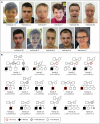DDX3X-related neurodevelopmental disorder in males - presenting a new cohort of 19 males and a literature review
- PMID: 40164730
- PMCID: PMC12322063
- DOI: 10.1038/s41431-025-01832-x
DDX3X-related neurodevelopmental disorder in males - presenting a new cohort of 19 males and a literature review
Abstract
DDX3X-related neurodevelopmental disorder is one of the most common monogenic causes of intellectual disability in females, with currently >1000 females diagnosed worldwide. In contrast, reports on affected males with DDX3X variants are scarce. The limited knowledge on this X-linked disorder in males hinders the interpretation of hemizygous DDX3X variants in clinical practice. In this study, we present a new cohort of 19 affected males (from 17 unrelated families) with (possibly) disease-causing DDX3X variants, for whom we collected clinical and molecular data. Additionally, we reviewed the existing literature on 13 males with DDX3X variants. The phenotype in males is diverse, including intellectual disability, speech/language delays, behavioural challenges and structural brain abnormalities. The vast majority of males have missense variants, including two recurrent variants (p.(Arg351Gln) and p.(Arg488Cys)). No truncating variants have been reported, consistent with the presumed embryonic lethality of complete loss-of-function of DDX3X in males. In our novel cohort, 6/17 variants are de novo in the affected male and 3/17 variants are de novo in the mother. This study provides significant insights in the genetic and phenotypic spectrum of males with DDX3X variants, by presenting the data of a combined cohort (n = 32) of novel and published individuals. Our data show that variants in DDX3X can cause an X-linked neurodevelopmental disorder in males, with unaffected or mildly affected carrier females. These findings will aid the interpretation of hemizygous missense variants in DDX3X and can guide clinical management and counselling, in particular with regard to recurrence risks in the respective families.
© 2025. The Author(s).
Conflict of interest statement
Competing interests: The authors declare no competing interests. Ethics declaration: This paper is consistent with the journal’s guidelines on issues involved in ethical publication. According to Dutch CCMO guidelines, no formal approval by an institutional review board was necessary due to the retrospective nature of the study. Consent was obtained from parents for publication of photographs.
Figures


References
-
- Blomen VA, Májek P, Jae LT, Bigenzahn JW, Nieuwenhuis J, Staring J, et al. Gene essentiality and synthetic lethality in haploid human cells. Science. 2015;350:1092–6. - PubMed
-
- Gadek M, Sherr EH, Floor SN. The variant landscape and function of DDX3X in cancer and neurodevelopmental disorders. Trends Mol Med. 2023;29:726–39. - PubMed
MeSH terms
Substances
Grants and funding
LinkOut - more resources
Full Text Sources

